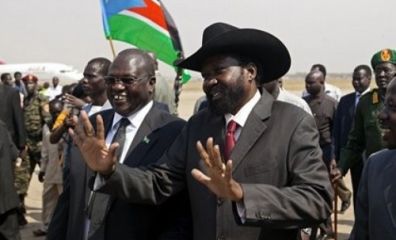Diversity should be accepted in South Sudan – Machar
May 27, 2013 (JUBA) – In their efforts to fight tribalism and strengthen national unity, senior South Sudanese political leaders continue to remind communities about the need to accept the unavoidable tribal cultural diversity in the new country.

Machar was referring to the 190 years [1820-2011] of collective resistance against slave trade, foreign invaders as well as the liberation struggle against Khartoum, which ended with the 98% vote for independence in 2011 by all the tribes in South Sudan.
He stressed on the need to reconcile the various communities and forgive the past differences created by the decades of war.
The country’s vice-president reiterated the call for unity during a thanksgiving occasion organized by the chairperson of the war disabled, widows and orphans commission, Deng Dau, in his house on Sunday.
Dau, who invited Machar and hundreds of intellectuals and other senior political leaders mostly from the former greater Upper Nile region, organized the get together event upon his return from abroad where he successfully underwent medical treatment.
South Sudanese are yet to adapt to the civilized world, but political and ideological differences often threaten to divide communities. Politicians who resist change always play the tribalism card in order to confuse and divert people from the real national issues, thus polarizing communities with the hope to survive.
Machar who plans to view for the top job in the nation, had earlier called on South Sudanese not to be divided on tribal lines by the normal political issues in the country.
He also told the South Sudan army (SPLA) to distance itself from the ongoing political debates on transformation process.
After the attainment of the independence of South Sudan, the next move was to democratically transform the system and provide good governance, deliver services and develop the nation, he reminded.
The SPLM secretary general, Pagan Amum, speaking at the same occasion, warned the aspiring leaders not to believe in the army and money.
Any leader who wants to lead the people democratically should not use the money to buy people or army to dictate others, he said, adding that it is the people that will elect their leader.
“If the people say they don’t want you, then you better quit and go home,” he said, without referring to a particular leader.
Amum and Machar have both challenged the incumbent president and party chairman Salva Kiir and wanted to replace him.
The presidential advisor on gender and human rights, Rebecca Nyandeng de Mabior, popularly known as Mama Nyandeng, widow of the founder of the SPLM, John Garang de Mabior, also at the occasion stressed the need to bring about change in the country.
She had earlier voiced concern about what she described as “redlines” in the party transformation process, critical of how the country and party affairs were being handled by the top leadership.
A number of other senior leaders, including minister of Justice, John Luk Jok, minister of Parliamentary Affairs, Michael Makuei Lueth and deputy minister of Defense, Majak D’Agot, also delivered their remarks.
Although the gathering was unlike the regional conferences of greater Equatoria and greater Bahr el Ghazal, falling short of deliberating and recommending on the political situation in the country, it was a clear message to the other regions that the greater Upper Nile region was keenly watching and aware of the unfolding events.
A source close to the leadership told Sudan Tribune that Vice-president Riek Machar has been discouraging the initiative by the greater Upper Nile to hold a similar regional conference and take a position as a regional bloc on the future of leadership.
(ST)
